Donate
The short version of this talk is that we don’t need to rewrite any of the existing social media applications that are out there like Twitter, or Facebook, or Google or any of the rest of them. The reason I’d like you all to remember that one thing is because it seems like every week for the last many years, I receive an invitation to the beta site of the next social media platform that is going to replace the existing big platforms, or a new search engine. So much money and time and code. And I know a lot of you probably use alternative social media, but none of these alternatives have come within hailing distance of Twitter or Facebook or any of the existing platforms. And they are never going to. And the reason they are never going to is because none of them address the reasons why all of the big platforms are in service to the highest bidder instead of us, why they were tempted to become evil and what gave them the ability to become evil.
So what I’d like to do today is go over what I feel are the main problems preventing us from having productive collaborative tools on the Internet and reliable knowledge repositories and then I’d like to suggest how we can resolve those problems once and for all.
The biggest problems I can see to collaboration on the Internet can all come under one of three headings which are noise, thought bubbles and truth dictatorships. So noise …

This is not the most illustrative slide I could have used, I chose this of course so I can show you all that for all the years Klout had this Top Influencers feature, I was either the second or third influencer to the man who is currently the Prime Minister of Canada. Right behind Justin Bieber. I can guarantee you if I had any real influence over this man, many of his policies would be very different. And I’m pretty sure Justin Bieber doesn’t have much influence over him either.
But on social media as it is today, this picture, this perception of influence, can translate into real influence. To the point that the former Prime Minister of Canada actually had a very hyped photo op with Justin Bieber because the perception is that Justin Bieber’s influence is so great that he can amplify the Prime Minister of Canada.
The reason for that is we are governed by ponzi schemes of celebrity, wealth and power and in order to benefit from these ponzi schemes, we need to enable and support them. No one has ever become wealthy by being of assistance to someone trying to survive in the streets. No one has ever become a millionaire by raising a baby. If you want to acquire wealth, you need to be of service to the wealthy so they can distribute that wealth down to you. And in order to gain influence, you need to promote and agree with and amplify those with greater influence so they can raise you up. And just as crypto-currencies did nothing to change this algorithm online, social media did nothing to change the ponzi scheme of celebrity. All either of them did is reproduce the same algorithm with all of the physical barriers lifted, so we have the same ponzi schemes but now the results are instant, we have overnight crypto currency millionaires and instant social media celebrities. We need algorithms which reward us for being of service to those who need it most and we have algorithms that reward us for being of service to those who need it least.
The reason these ponzi schemes are preventing us from having useful collaboration is because not only is celebrity not real influence, the two are mutually exclusive.
What celebrity means is you are riding the peak of the wave of socially acceptable opinion. You already appeal to the widest audience. It means you have no thoughts in opposition to acceptable mainstream opinion, celebrities reflect the opinions we all already know and agree with. You are not a voice that is seldom heard, by definition, and you definitely don’t speak at a level of elite expertise that is difficult for all but a few to understand. Celebrity is Donald Trump. Someone who speaks at a grade 3 level. The more easily understood and the less challenging your message, the wider your appeal will be. Celebrities are the status quo so amplifying celebrities is just creating more noise for the status quo, and making it harder to find anything innovative or understand anything challenging.
So it is counter intuitive to think celebrities can influence us to move in a new direction. If we want to hear the voices that are seldom heard, that expand our Overton windows and give us some fresh perspective, or require some elite level of knowledge to explain some breakthrough of the kind we require to solve the problems in front of us today, amplifying celebrities is the exact opposite of what we ought to be doing.
The other noise the Internet has brought us is astroturfing.
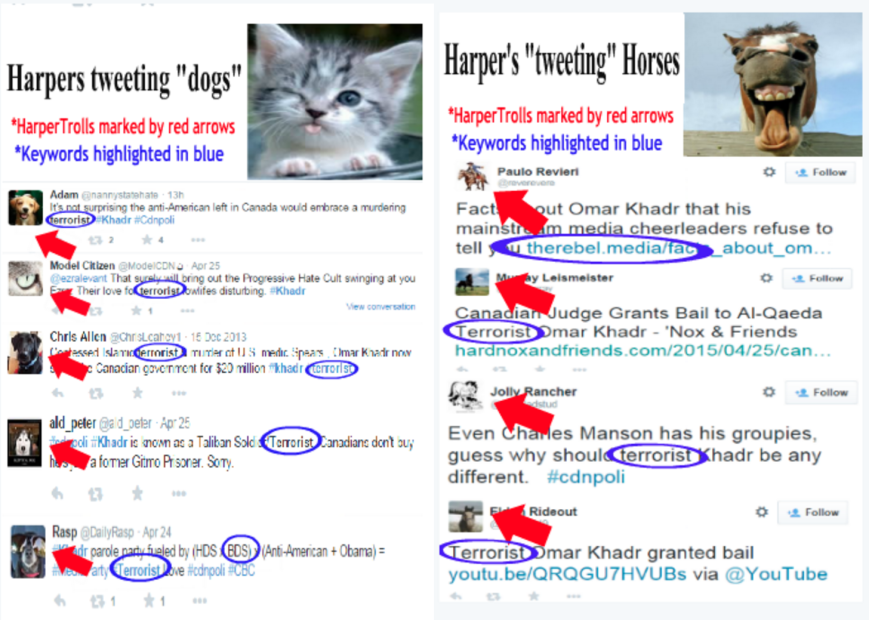
A few years ago if you said something was astroturfing, people would look at you like you needed a tinfoil hat, but now this has become so mainstream most states brag about their cyber warfare and their cyber armies. This is all that is. It is propaganda designed to drown out all information the states and corporations who pay for it don’t want you to see. For those of you who don’t spend a lot of time on social media, this is what it looks like. Every time this man was in the news, for years, the Internet would be hit on all forums, on article comments and on social media by these bot armies. These ones have avatars of horses and dogs, sometimes they have eggs or the canadian flag, but they all do the same thing which is fill all the forums with aggressive and unintelligible comments that just serve to tie this person to certain keywords, in this case terrorism.
Astroturfing is really annoying. It can be intimidating or frightening, some of it is really aggressive. It contributes a great deal to all the noise we have to wade through looking for signal. It is frustrating, you never know if you are talking to a real person or wasting your time with a bot, and it is very chilling to online conversation. It has made Twitter especially almost unusable for rational conversation.
The next problem is probably the most disappointing to those of us who were around when the Internet became a thing.
Thought bubbles
The most exciting thing for most of us I think in the early days of the Internet or even bbs’s, the most exciting thing was being able to connect with people who you never dreamed you would ever be able to connect to. And I don’t just mean people across the world, we have google translate so now we can understand them, but people with perspectives that you would never dream you would be able to have a conversation with, much less find empathy and common ground, but if you talked to them long enough you began to find that you do have common ground and you begin to understand their viewpoint a little more even if you don’t agree with it. You can begin to make some accommodations and sometimes we even change each others opinions online.
But it turns out this only happens until a forum reaches a certain size. Once a forum has reached a certain size and the people there have spent enough years with each other and discussed enough topics and reached some consensus around many topics, what happens is they start to create their own culture and develop their own ideas of what are acceptable viewpoints, and their own ideas that it is taboo to hold just like all cultures do. And then what happens when an opposing viewpoint comes into these forums is they are pushed out and shunned till they go off and create their own little thought bubbles of people who agree with them. And just as they weren’t allowed to participate in the main forums, they push out everyone who disagrees with them. And they bring all the supporting documentation that supports only their ideas. Then Facebook and Google see what they are interested in and feed them even more information in support of their views. So they begin to see only one viewpoint ever and they live in this little purified thought bubble where only their thoughts exist, just like the main larger forum is also now living in a purified thought bubble, but this thought bubble is created in opposition to the thought in the main bubble. So it is like a little cancer there. It is like an auto-immune disease that the wider society is usually not even aware it has or it doesn’t take them seriously until you get someone like an Elliot Rodger who comes out and kills a bunch of people they have been taught to hate.
Then when that does happen, the wider society does not typically come out and say, Oh, we have alienated all of these people, how did that happen and what can we do to re-establish communication and reach some common ground? What usually happens is the smaller group is vilified even more and shunned even harder so they become even more alienated and it creates an even deeper divide.
We have always had sectarianism, of course, sectarianism has been with the world for a very long time, but it used to be something that happened more between you and people ‘over there’, people you never saw or communicated with. Now thanks to the Internet we can never communicate with people we live right next door to and the sectarianism is more and more within our own societies. And yes, a lot of it was always there as classism, sexism, racism and other bigotry that was just painted over and the thought bubbles are useful to be able to be heard and explore things you can’t in wider society, but there reaches a point where the divergent viewpoints need to come together and seek resolution and that is where we are failing.
Also this is not all happening organically, definitely it is also something that is being helped along by the same type of people who brought us astroturfing, there are people on the internet who are there to promote division, and profiting from it. But whether it is organic or manufactured it is a problem we need to address.
This next slide I always feel should be Wikipedia’s landing page.
One truth
These are what I call truth dictatorships. This is where you have group of people and they all have to come to consensus, they all have to agree, and what they are looking for is the truth. So they all have to fight about which is the truthiest truth, and once they have lined up all their truthy truths they have to rank them all in order of importance. These truth dictatorships are of course great at promoting the status quo, and celebrity ponzi schemes, they create thought bubbles, but they have a special added feature I call photoshopping. Photoshopping is where you take every story and you just erase everything that doesn’t suit your world view by saying it’s not the most relevant part of the story. Wikipedia is great at this, you can spend weeks clicking through that site and never find anyone that is not a caucasian man. I used to say women didn’t need anonymity, we all come with built in proxy routing, everything we say is routed through the nearest man. But actually there are many parts of society that could say that.
But here is an unusual example.

Here is a person who is running for president of the United States, for the second time. But there is nothing on her Google blurb to indicate that. That wouldn’t be at all unusual if she was from anywhere else in the world, but if there is one group of people at the pinnacle of the celebrity ponzi scheme it is the US. Their never ending spectacle of an election is impossible to escape on any media but especially on Google.
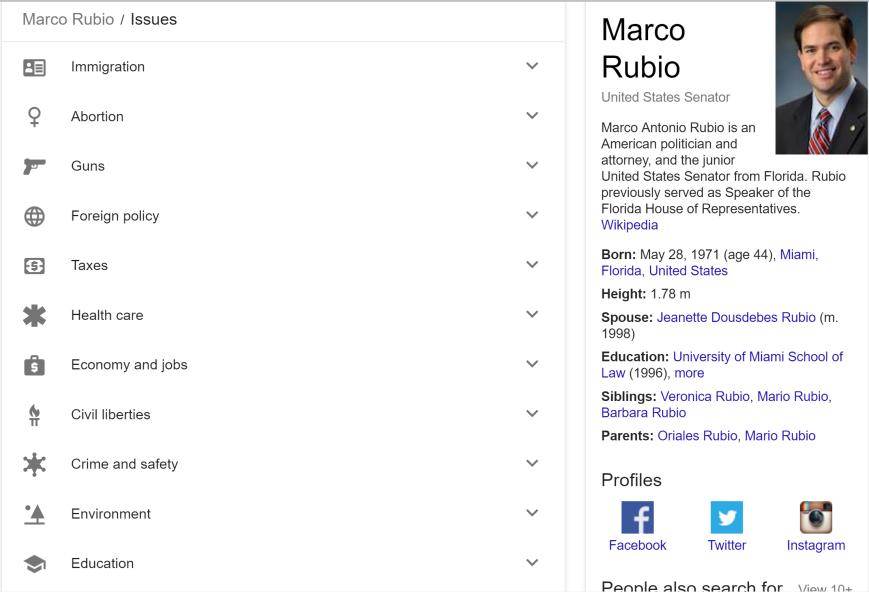
Here is what Google shows for every candidate from the two main parties, and this is his first run and he did not even get the nomination of his party. But there is a huge amount of information on all of his policies on every topic, it is really obvious that he is running for the presidency. This is what you get for the candidates from either of the two main parties but not any third party candidates.
But Google is just a search engine. It is obvious they got their blurb from Wikipedia, they probably got the policy information from another third party site, so this isn’t really fair. Google can’t help what it finds on the Internet. So let’s just ask them.
Google, who is running for president of the United States?
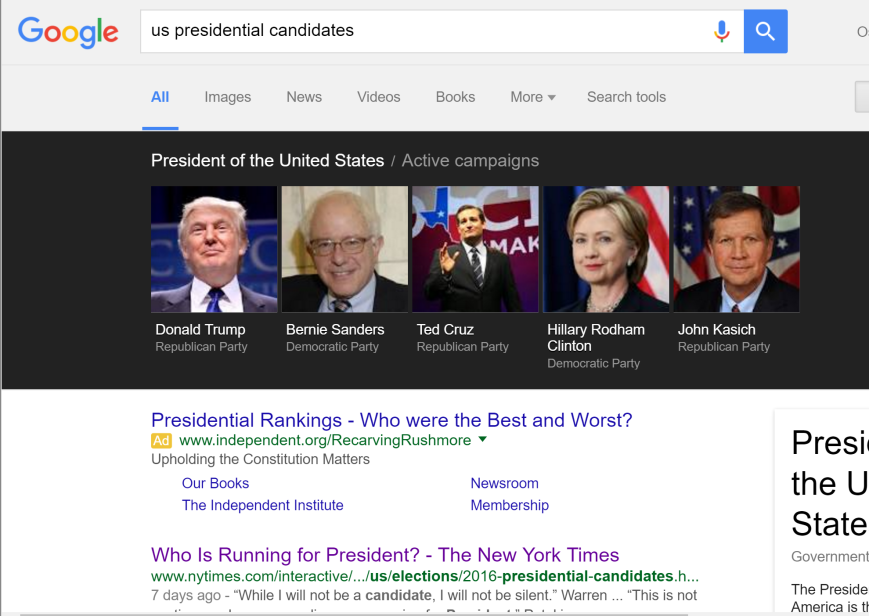
And they flat out lie. We can’t blame this on anyone else, this is Google’s answer and they flat out lie. We didn’t ask who are the candidates from the two main parties, we asked who is running, end of, and they photoshopped out everyone else.
And if you like we can click that article below from the New York Times with the same heading to see how mainstream media does

And we get the same thing. Photoshopped again.
So this is where social media would really shine. When you can’t trust the big corporations like Google and NYT, we can rely on each other to keep ourselves informed, that’s why social media was so exciting.
So let’s look at this same candidate on Twitter.

Those of you who don’t follow a lot of people from the US on Twitter probably don’t see what’s strange about this, but Twitter has this thing called blue checks. What Twitter says a blue check means is it means that you are really important. It means you are a real person, and you are an extremely important person. What it actually means is you are from the US and you are probably a caucasian man. For years, no African heads of state had blue checks and most don’t even now. Outside of the US it is very difficult to get a blue check. But within the US, the most tenuous connection to politics, to tech, to journalism, to Twitter’s frat boy parties … the most random people have blue checks.
So you can see how this would be really confusing if you lived in the US and you wanted to know who you can vote for in your federal election. This person says she’s a third party candidate, but she can’t be a very serious candidate because she doesn’t even have a blue check and even the neighbour boy down the street has one.
And that’s what photoshopping is. If she doesn’t exist, you can’t vote for her.
So, noise, thought bubbles and truth dictatorships.
The problem here is not with the software, it is the way the web was designed. Just like crypto-currency did not change the algorithm that creates ponzi schemes of wealth and social media did not change the algorithm that brought us ponzi schemes of celebrity, the web did not change the ponzi schemes of information and it was not designed to. The web was created to mirror academia. Isolated pages of information citing other isolated pages of information. It was never designed for mass collaboration. We hear so much about walled gardens, but the Internet is a series of sealed wells. Even if we have access to everything on the surface, we do not have access to the information in the wells that is feeding all the life on the surface. And to add insult to injury, we created everything in those wells.
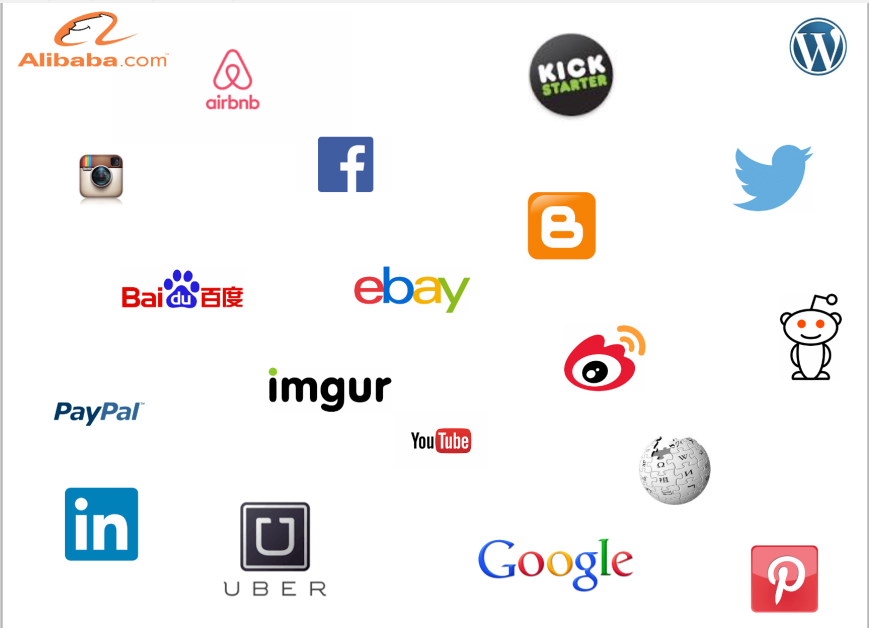
Look at these logos for a minute. And think about the amount of money each of these logos represents. The last I checked, alibaba was worth 65 billion. Uber is worth 60 billion. Airbnb is over 25 billion. And what do these corporations do? In every case, these corporations are a page that seals a well of user created information. The only service they provide is web hosting. Yes, I know they have written a lot of front end software and many of them have released a lot of great software to the open source community and that’s great, but that is not where the value is. If it was we wouldn’t be getting it for free. The value is in what the users created, our data.
And think about the control these corporations exercises over all of our data, which is our work, our networks. From monitoring our shopping habits to Facebook deciding to what mood we are in or whether we vote.
There is no point in creating another Twitter, another Facebook, another Google, another thought bubble with its own sealed well that doesn’t address any of these problems.
This control of user information is what created the fertile ground for corruption in the first place. Control corrupts. Absolute control corrupts absolutely.
We have free software. We are working on free networks. We need free databases.
So if we were to release all these 100s or 1000s of billions of dollars worth of value and put it back into the global commons and return control to the people who created this data, how would we do that? How would we create a universal global commons database that we were all free to use in any way we like?
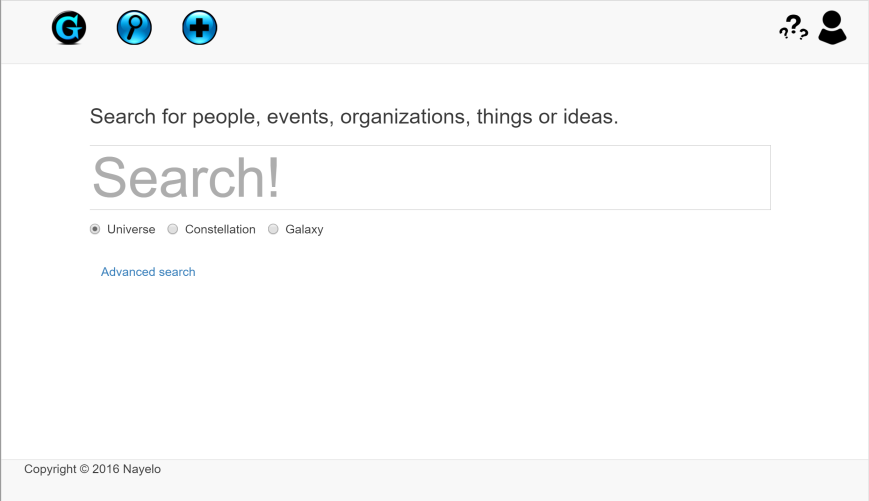
So given that we want to deal with a database, here is a little 2 button app that does everything we ever do with databases. We can search, or we can log in and create, update and delete. And there are five entity types that I think will allow us to do everything we do in any of those applications.
What these entities are is stripped down atomic objects that we can use to create larger meaning from. If you look at me as an object, any attributes you were to identify are very subjectively important. I used to say my official documentation decided the most important things about me were my name, date of birth and gender and they could just as easily have used my eye colour but now my official documentation does not require gender and it does require an iris scan so I guess someone agreed with me. But almost anything you can say is very subjectively important and changeable, so these are extremely stripped down entities. A person node is only an optional start and end date, usually correlating to date of birth and date of death, and a name. And we can all agree on just a name as a base data node we can all link to, right?
Of course not.
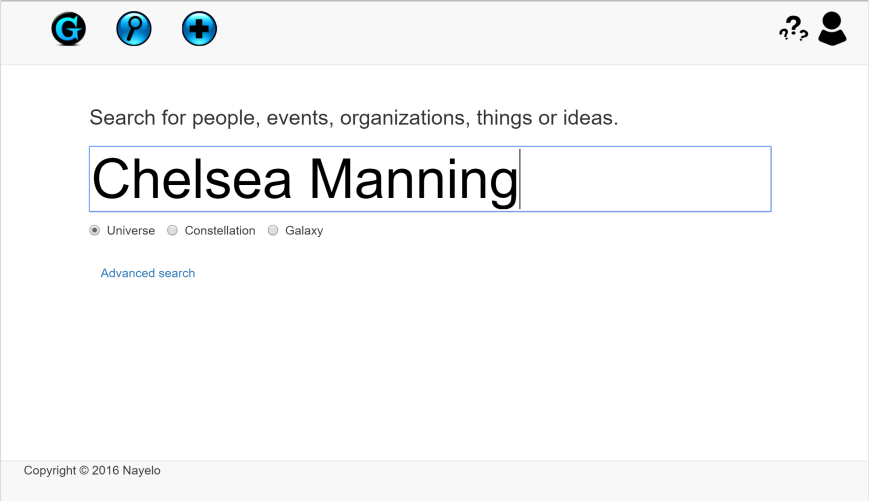
How many of you remember what happened on Wikipedia when Chelsea changed her name from Bradley Manning to Chelsea Manning? If you missed this you really should look it up. It is the most perfect illustration of why we can’t have nice things in truth dictatorships. It was amazing, days of war waged over, who is the official authority for Chelsea’s name? Does she get to decide what her name is, or is her government the authority we should listen to? Or maybe we should rely on the journalists who write about her to decide. Was she more relevant when she was called Chelsea or when she was called Bradley, and should we use that to decide what her name should be? This is why we can’t have nice things in co-operative dictatorships.
The answer is really easy, Wikipedia.

These are two temporal realities of the same object. This is a hypernode. She was Bradley, now she’s Chelsea. It doesn’t matter which you choose, no one is going to argue with you, and your work will still appear associated with this same object.
These are temporal realities, she was Bradley, now she’s Chelsea, but there are also other kinds of realities.

Here is a perceptive reality. Las Malvinas, The Falklands, or if you are the UN and you just don’t want to get into it, they are still the same islands and whichever you choose, your work will still appear. Or if you like, you can call them The Penguin Rocks. Go for it, create a new reality, call them The Penguin Rocks, nobody cares, you don’t have to ask permission and no one is going to stop you, they will still be linked to the same rocks in the middle of the ocean.
But this brings us to a problem. How are people to know that The Penguin Rocks are not a name that serious people call these islands? There are couple of ways we can get around that. First, we can let them say they are joking, put a little fiction toggle on that reality and anyone can choose to filter it out. And the second is we use trust networks. We don’t have likes, we don’t have stars, or hearts or friends or followers, we have trust networks. A trust network is exactly like it sounds, people whose judgement we rely on. If you filter your search results within 2 or 3 degrees of your trust network and these Penguin Rocks don’t show up, it’s a good chance they are spam or astroturfing or trolls. So as long as you keep your trust network clean we are back to a place where we can actually work with the Internet again and we can filter out all those people who have made collaborating on the Internet impossible for all these years.
So we have three reality types, we have temporal, perceptive, and linguistic which is just like it sounds. And we have 5 entity types. And the reason we have these different reality and entity types by the way is because they have slightly different attributes so we can do things like attach geotags to events and organizations and map them or string temporal realities along in a timeline. So that’s nice. But it’s still not terribly useful or meaningful. There’s still not much we can do with this as an application. We have a global commons of data, we can all pull from it, that’s nice but in order to actually pull any meaning from it, if you look at me again as an object, there is very little you can say about me without relating me to another data object. I did this for this organization, I was this to this person, I did that at that event.
Usually these types of relationships are part of a schema that is part of the application developed by programmers. If this is ebay there is a programmer somewhere saying this is a buyer, this is a seller, this is a product and so on. But these things do not have to be coded by programmers and in fact they shouldn’t be. Programmers don’t know how users are going to use their data. People are always going off and doing peculiar things with the data and then programmers have to change the schema and it is usually difficult. So we can just allow users to create category trees like this to map all possible categories for each of the 5 entity types and every relationship between them.
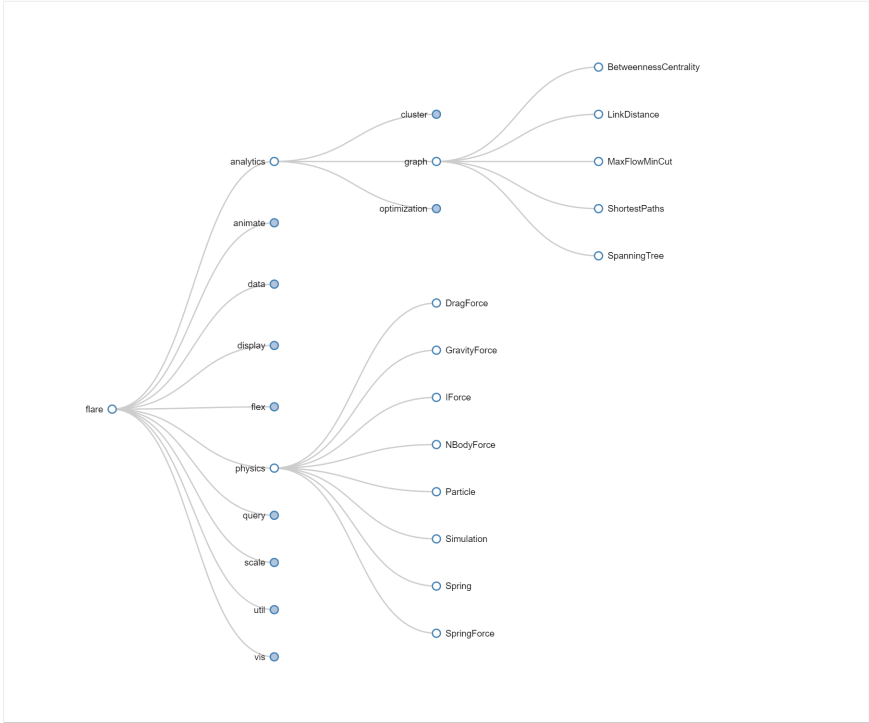
This is beyond the ability or the interest of the average user, to create a schema for all these relationships, but it is not beyond the ability of a data analyst with knowledge of the sector. This is like blog themes, a blog platform gives you the ability to create blogs but if nice people create themes for it they provide more versatility and usability for a greater number of use cases. So if data analysts create category trees, users can pull them in to use in their own work.
If you remember the little 2 button app I showed you earlier, there were three places you could create. One was the Universe which had all the data nodes in the global commons, but there were also constellations and galaxies. A constellation is your own autonomous space where you can work by yourself or add editors or open it up to however many degrees of your trust network. In a constellation, you can take data nodes out of the data commons, use a category tree that some nice person has made and map all your data.
Here is a database most of you are probably familiar with. It’s called littlesis.org and it’s great.

This is really nice, someone has written a little d3 front end and they let you embed this graph in your work or share it on social media or export the data. But it’s still a sealed well. If you want to add any data to it, or add any front end functionality, you have to go through littlesis. Or export the data to your own sealed well and not collaborate with them at all. If this was on G, that little 2 button app we saw earlier, anyone could use the exact same category schema and create data in the exact same format as this. If you tapped on one of these nodes you would see everyone else’s work associated with it, even if they used entirely different category trees or had completely different ideas of what was important. Imagine if this was the Panama Papers data. ICIJ could have just created a constellation and added them all as editors and just mapped the data as they found it for us all to see. Then we could create our same constellations around the same data nodes so they could see oh, that person was also involved in this corporation, we should run a search on everyone else in that corporation as well. And even if they still hoarded all of the data, we could share information from the beginning and it would have been so much faster and more productive. And we would have the data in a usable format. They actually did use linkurious to map it all, we could have had all that in a global commons for us all to build from instead of these unusable wall of text articles everywhere.
And you could add any front end functionality you want.
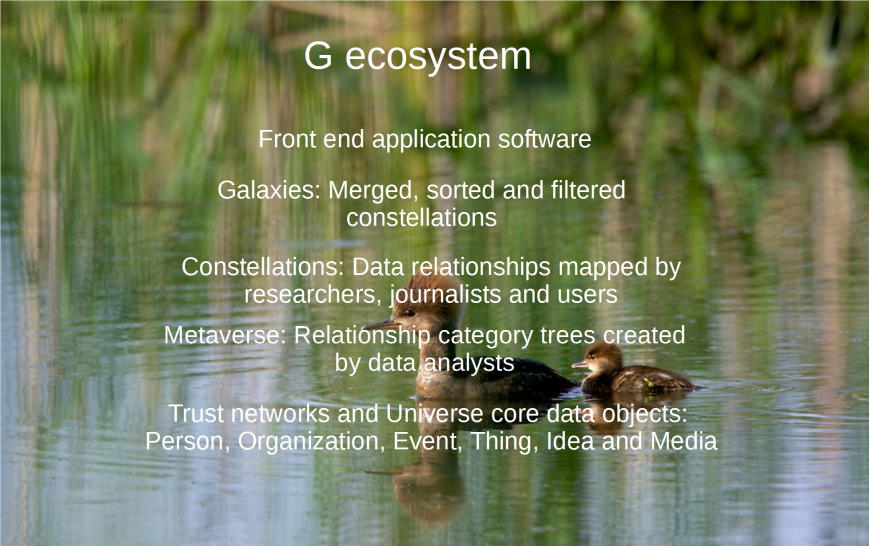
Usually in an app you just have the programmers and the users. But once we decouple the database and the trust networks we’ve got the core programmers for the database, the data analysts who create the category trees, the researchers and journalists who map everything in constellations, and then the users can take those constellations and add their own meaning and functionality. Suppose you were a taxi driver. You could create a constellation of all your local taxi drivers, and then someone else could gather all the constellations of all the taxi drivers and have a global database of taxi drivers. Novel new idea. We just took 60 billion dollars worth of value from Uber. Or you could filter that database down to just your region and within one degree of trust and you can download that galaxy onto your phone and add a little bit of front end software that adds functionality for you like paying your taxi driver.
Or if you are a politician, suppose you are a pirate politician and you have a blog, but you also belong to the pirate party of Germany and an international galaxy someone has created of all the environmental groups from all the pirate constellations. Now you can add blogs at every level, or loomio decision making software, or schedules or whatever you like.
Because now that we have split out the databases and trust networks, all those unicorn corporations we saw earlier are reduced to their real value which is bits of front end software that provide some collaborative tool or whatever it is they do.
And now users have their choice back. If any of that software starts antagonizing its users, they can just get rid of it and use something else and they will not lose all the work and the networks they have spent years building up. And they can choose the functionality they want. They don’t have to go through facebook for everything whether they are logged in or not, they can have a little stripped down read only app on their phone and a giant application on their laptop because it is not one product now it is an ecosystem, anything can be replaced without destroying the whole. And it doesn’t matter what application you use, you can still collaborate with everyone else because that happens at the data level.
So we have a way to filter out astroturfing and spam. We don’t have celebrity ponzi schemes now because it is all about the people doing the work. We can isolate ourselves but we can’t create community thought bubbles, everyone has control of their own information. We have diversity of opinion and we allow for different realities. And we can let our own trust networks decide what we want to be shown and not leave it up to Facebook and Google.
Right now I’m rewriting this in React and using IPFS. If anyone wants to help, money is welcome, pull requests are welcome.
More information: http://www.getgee.xyz/

I did do some work putting together relational debases but nothing so complex that meant I would need to write script. Sorry I’m as useful as tits on a bull and so little money. Perhaps I can make your coffee and do other menial tasks while you do the real work. For this I would be honoured. I wait earnestly for this awesome idea to bear fruit.
LikeLiked by 2 people
If we get the base off the ground and usable there will be plenty of room for anyone else to contribute however they like. Thanks for the well wishes. 🙂
LikeLiked by 1 person
What do you think about having edges in graphs of concepts encode the fractional reliability or trustworthiness of the link? Then Bayesian inference can be done over the graph to give a quick estimate of whether something is likely true or false.
Then, showing the N most different versions of e.g. a given wikipedia page above some trustworthiness threshold would allow it to represent and reveal controversy in a way it presently cannot.
LikeLiked by 2 people
I think that’s really interesting and something that could be possible in an alternate implementation, as an option instead of the current trust network filter or as an added filter layer above the base G layer. It looks like something that could be done in metaverse which is where I associate meaning to edges. Did you join the mailing list? And are you a software developer?
LikeLike
Presumably the software itself is going to be open, and you are cool with the idea of people writing implementations in other languages, eventually?
I’m thinking about deployment. I work in Ruby, and boy do we know about deployment headaches with that language. Seems like you want anyone to be able to install this, easily, though.
I don’t know much about Meteor, but I’m guessing that this will mean it’s just “npm install gee”. Could be worse. I do worry, though, that the Node people have already demonstrated a willingness to take over a user’s project without their permission when they wanted to (admittedly when the whole npm repostory would have fallen over otherwise, but). Is that paranoid? Probably…
This is a really cool thing you are doing, whether it takes off or no. Wish you were doing it in Ruby so I could actually be of any use and help. (Don’t do it in Ruby; see above.)
Good luck.
LikeLiked by 2 people
Of course it will be free and open software and whoever can deal with a Mongo database can write whatever they like for it. The base layer (G itself) is really just managing the db, all added functionality can be written by anyone who can use that data.
LikeLike
Enlightening. I can’t contribute in any way but you’ve thoroughly opened my eyes with these concepts. BOL in your endeavours.
LikeLike
Pingback: My favorite book | adamkendall2